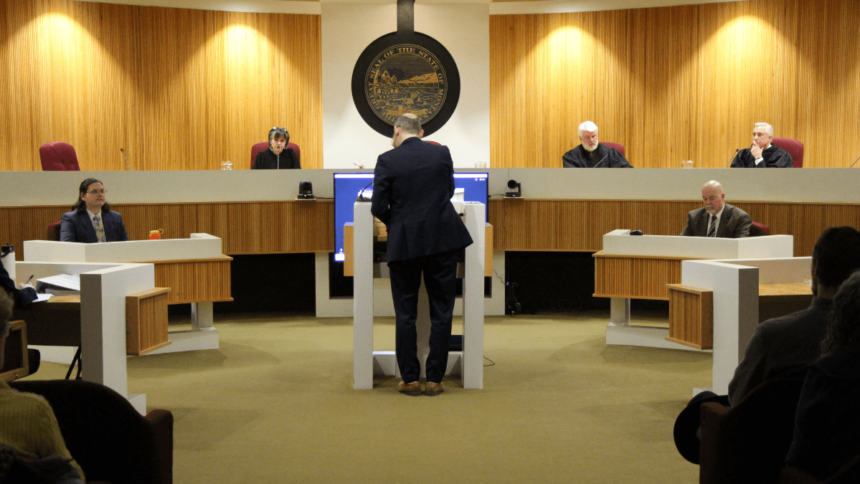The Montana Supreme Court on Wednesday ruled that a 2013 law requiring parental consent for minors to obtain an abortion is unconstitutional, finding the statute violates a minor’s right to privacy and equal protection.
The 36-page decision authored by Justice Laurie McKinnon upheld a 2023 state district court’s decision in the matter and came after attorneys for the state and plaintiffs in the case, Planned Parenthood of Montana, delivered oral arguments to the court this spring.
The unanimous ruling found that because the Montana Constitution grants minors the same rights as adults, the Parental Consent for Abortion Act “violates the fundamental right of a minor to control their body and destiny” and again asserted the court’s 1999 precedent that abortion access is protected by the right of privacy outlined in the state Constitution.
“We emphasize that our decision is not based on, nor do we presume to answer, the profound questions about the moral, medical, and societal implications of abortion. At the end of the day, those questions are left to the woman who must decide for herself. We also acknowledge that the State has a substantial interest in preserving the family, protecting minors, and protecting the rights of parents to raise their children,” McKinnon wrote in the court’s conclusion.
“However, when weighed against the right of a minor to make the most intimate and personal decision of whether to carry a child to term, the interests expressed by the State must be furthered by and substantially related to the legislation itself, and the legislation must be narrowly tailored to meet only those legitimate legislative goals,” the ruling continued. “A minor’s right to dignity, autonomy, and the right to choose are embedded in the liberties found in the Montana Constitution. Because a minor’s right to control her reproductive decisions is among the most fundamental of the rights she possesses, and because the State has failed to demonstrate a real and significant relationship between the statutory classification and the ends asserted, we hold that the Consent Act violates the Constitution of the State of Montana.”
The court’s decision brings to a close a drawn-out chapter of litigation over an older attempt to put conditions on abortion. The 2013 Consent Act never went into effect because of Planned Parenthood’s early legal challenge and a preliminary injunction that blocked implementation while litigation ground on.
The Wednesday ruling does not encompass or impact another 2013 law requiring parental notification for a minor child’s abortion — a separate but related statute that is still being litigated in state district court.
Planned Parenthood of Montana President and CEO Martha Fuller praised the ruling in a statement Wednesday afternoon.
”This decision affirms the right to privacy and we are pleased that the Court upheld the fundamental rights of Montanans today. Montanans deserve the ability to make private medical decisions and have the ability to access abortion care if that is what is best for patients and families,” Fuller said.
Emilee Cantrell, spokesperson for Attorney General Austin Knudsen, did not respond to a request for comment about the ruling.
In a briefing filed with the court last October, attorneys in Knudsen’s office argued that Montana law allows the state “to permissibly restrict minors’ rights by passing laws to protect them,” and that the Consent Act of 2013 is one example of that power.
“Parental involvement in life-altering decisions by minors is critical because minors often lack the ability to make reasoned, considered decisions in the same way adults do,” argued Deputy Solicitor General Brent Mead, later stressing that abortion “involves serious psychological, medical, and safety concerns for minors.”
The state also highlighted the role of the “judicial bypass” provision outlined in the 2013 law, which allows minors to appeal to a judge if they believe that seeking parental notification is not in their best interest, typically due to domestic physical, emotional, or sexual abuse.
With that accommodation in place, the state argued that the law helped maintain the primacy of the relationship between parents and their children and provided a mechanism for parents to be aware of potentially nonconsensual or predatory relationships their children might be subjected to.
“The Consent Act unquestionably protects minors and promotes parents’ rights to the custody, care, and supervision of their children,” the state wrote.
The Wednesday ruling rejected those arguments on various grounds. Citing precedent from an earlier case, Weems v. State, about whether advanced practice registered nurses could provide abortions within their scope of practice, the court reiterated that “abortion care is safe and presents relatively minimal health risk” and that it was, therefore, appropriate to “dispose of any of the State’s claimed compelling state interests” based on abortion presenting “bona fide” health risks.
“The State has failed entirely to address Weems; indeed, the State has not mentioned Weems and this Court’s conclusions and analysis in any of its briefing, despite Weems being significant precedent for resolving this challenge,” the court wrote.
The decision also found that the state had “failed to logically connect and justify” how the Consent Act could identify or prevent sexual abuse of minors.
“All the Consent Act does is permit the parent to refuse consent to a pregnancy that has already occurred. Thus, the Consent Act does not accomplish the state’s asserted purpose of preventing the victimization of children from sexual assault and does not make it more likely that the sexual crime will be detected and punished,” McKinnon wrote.
The court’s ruling agreed with the argument put forth by plaintiffs that the Consent Act created two classes of pregnant minors — those who wanted to seek health care for the continuation of their pregnancies and those who wanted to seek health care to terminate their pregnancies — but applied restrictions only to the latter.
In that way, the court indicated it was unpersuaded by the state’s claims of using the Consent Act to protect minors from immature decisions.
“The State’s argument is illogical: minors who choose to carry their pregnancies are not at risk of making an immature decision, while those choosing abortion must be protected against their immaturity,” the court ruled. “While the Consent Act prevents a minor from obtaining an abortion without parental consent, contrarily, a minor ‘has the right to relinquish all rights to that minor parent’s child and to consent to the child’s adoption’ without obtaining parental consent … Minors can consent to many types of health care, including pregnancy-related care, but abortion is singled out.”
A representative of the Montana Family Foundation, a conservative Christian policy group that filed an amicus brief in the case, disagreed with the court’s equal protection conclusion and cast the decision as “radical” in a Wednesday interview.
“This decision drives a wedge between parents and their minor daughters. And while the court praises the supported safety and efficacy of abortion, it forgets that abortion undeniably terminates the life of the unborn child,” said Derek Oestreicher, the group’s chief legal counsel.
While parental consent and parental notification present two different legal issues, Oestreicher said that he expects Wednesday’s ruling to likely influence the ongoing litigation about whether the state can require parental notice for a minor child’s abortion.
“It’ll certainly play a role,” Oestreicher said. “Bad law begets bad law.”
The Montana Supreme Court is currently deliberating several cases involving other abortion limitations passed by lawmakers and signed by Gov. Greg Gianforte in recent years. Those include whether laws restricting Medicaid funding for abortion, prohibiting the most common type of abortion procedure in the second trimester, and requiring the offer of an ultrasound prior to an abortion should be allowed to take effect while litigation continues.
An appeal of another district court case that struck down abortion prohibitions from 2021 is also pending.
LATEST STORIES
Republicans, Democrats float ideas to lower home property taxes
Candidates across Montana’s political spectrum expect the state’s 2023 spike in residential property tax bills to be top of mind for many voters as they head to the polls this November. As such, Republican and Democratic factions are floating a variety of strategies for providing property tax relief to homeowners as candidates compete for support from frustrated voters this year.
Montana Gov. Gianforte continues to rake in outside income as he seeks a second term
Montana Republican Gov. Greg Gianforte reported more than $23 million in income over four years ending in 2022, as the former technology executive who is seeking reelection to a second term continues to rake in money from investments, according to tax records released by his campaign.
Growth is coming for Lewistown. Can local leaders guide it?
Lewistown, a small city smack dab in the center of Montana, was until recently sheltered from many of the winds that have driven the flames of land-use debates in other communities. As that changes, city leaders hope a new approach to land-use planning will help guide the area toward healthy growth.





